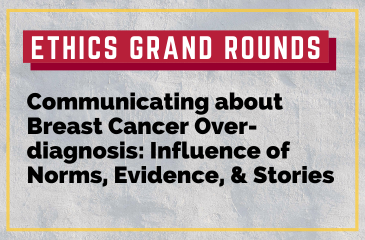
Most American women are not aware that routine mammograms can lead to overdiagnosis and overtreatment of breast cancer. Dr. Gollust presents findings from a 2019 survey assessing women's attitudes about breast cancer screening and their response to various messages about the potential for overdiagnosis. She discusses the ethical, political, and communication challenges related to balancing competing evidence-based recommendations amid a complex, politically-charged information environment.
This was an event of the Office of Academic Clinical Affairs (OACA) hosted by the Center for Bioethics and created in partnership by the following University of Minnesota units: the Masonic Cancer Center, the Division of Health Policy & Management in the School of Public Health, the Hubbard School of Journalism & Mass Communication, and the Women's Health Research Program.
Speaker(s)
Sarah Gollust, PhD, is an Associate Professor in the Division of Health Policy and Management at the School of Public Health; and an Affiliate Faculty at the University of Minnesota's Center for Bioethics. Public health research identifies numerous potential opportunities to improve population health. Yet when it comes to translating this research into policies and programs to improve public health, roadblocks emerge. Prof. Gollust's work looks to examine processes through which health information gets translated into the media, shapes public attitudes and opinions, and influences the health policy process. By describing the political, social, ethical, and psychological factors that moderate this process – and often pose as barriers – her research yields insight into how communication to the public and policymakers can be more effective. She has applied this research approach to several important public health challenges, including policies to address obesity, health disparities, the Affordable Care Act, and cancer screening and prevention.
